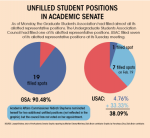Student government officials left 20 out of 21 undergraduate student representative positions in the Academic Senate unfilled for half the academic school year.
The Academic Senate, which decides on matters like enrollment and degree requirements as well as program establishment, has 42 positions reserved for graduate and undergraduate student representatives on 15 committees. Student representatives are responsible for attending committee meetings, providing student input and reporting back to their respective associations.
The Graduate Students Association had filled 19 of its allotted 21 positions as of Feb. 12. The Undergraduate Students Association Council had filled one of 21 positions as of the same date.
The USAC Academic Affairs commissioner is responsible for appointing all undergraduate student representatives to Academic Senate committees, according to the Associated Students UCLA Undergraduate Student Association bylaws.
Three months after making her first Academic Senate appointment, Academic Affairs Commissioner Nidirah Stephens introduced seven appointments to the USAC meeting agenda Tuesday. President Claire Fieldman asked if the confirmations could be delayed for time to review the students’ applications, but the nominations were added to the agenda and confirmed the same day.
Joseph Bristow, the Academic Senate chair, said he thinks student representation on all committees is crucial, adding his office has sent messages to USAC asking them to fill these spots.
“These things are so important to us, and our office keeps sending out messages like ‘Please, you can find out about shared governance through this and (give) your opinions and your insights,’” Bristow said. “Once we have a representative in place, that person can consult widely and give us feedback.”
Until the Tuesday meeting, the Committee on Undergraduate Admissions and Relations with Schools had no undergraduate representation. CUARS is discussing whether standardized tests, like the SAT, should be used in holistic admissions, said CUARS chair Rene Ong.
Ong added undergraduate representatives bring an important, firsthand perspective as students to committee discussions.
“Who better than students who have recently been in high school, and had to go through the admissions process, and in particular had to go through UCLA’s admissions process, who better than them to be able to weigh in on a lot of these issues?” Ong said.
Following Tuesday’s confirmations, seven committees still lack undergraduate representation. One such committee, the Committee on Library and Scholarly Communications, has been discussing the open access movement, which seeks to ensure scholarly material is made accessible for students and the university at affordable costs.
Other committees without undergraduate representation are the Committee on Academic Freedom and the Council on Research.
Both Bristow and Ong said they noticed a lack of undergraduate student representatives this year in comparison to previous years.
“I’ve been on the committee for three years, and we’ve had good student representation for the other two years so we’re definitely lacking and very much missing a student (perspective),” Ong said. “You know, they’re really important.”
Bristow said he was surprised by the low number of undergraduate representatives, but added he understood USAC was making an effort to fill these roles.
“I just couldn’t believe how many empty spots there were, and I’ve just been wondering what’s been going on,” Bristow said.
Stephens said she has had a difficult time appointing students to the Senate this year because the students she had been reaching out to could not commit enough time to the positions due to their involvement in other campus leadership roles, and that she has had to rethink her recruitment strategy.
“It’s really about educating students and making sure they’re aware of what Academic Senate is, so it’s been an educational process,” Stephens said.
Stephens said she was able to get more appointments – seven in one night – after looking to students who may not be as involved in campus leadership, but are more willing and able to commit their time to the Senate. She added she has been transparent with Senate leaders about the difficulty she has faced thus far.
Christine Botello, a third-year sociology student, said she thinks the positions sounded interesting but added students may not be able to participate fully in those roles due to other commitments.
“I feel like it’s just hard, coming in as transfers, and trying to rush to get everything done,” Botello said. “It’s nice to get involved, but there’s only so much you can do before it conflicts with your pay, which is for you to live here, and also academia too.”
Jennifer Garcia, a third-year Chicana and Chicano studies student, said the lack of student representation may reflect students’ lack of engagement, but added she thinks USAC should do more outreach to students about the positions.
Ong said serving as an Academic Senate student representative does require active participation, but committees make an effort to make students feel welcome.
“It’s certainly not too late for this academic year,” Ong said. “We would very much appreciate having somebody who would participate and take it seriously.”
